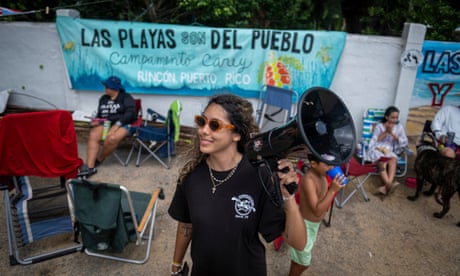- by foxnews
- 09 Mar 2025
‘The beaches belong to the people’: inside Puerto Rico’s anti-gentrification protests
‘The beaches belong to the people’: inside Puerto Rico’s anti-gentrification protests
- by theguardian
- 24 Jul 2022
- in news

Wearing swimsuits and holding tight to their sledgehammers, hundreds of people flocked to Los Almendros beach in early July to take apart a structure that would have been an infinity pool just a few yards away from the coast. The protests against the structure, which a condominium started building last year, continues to grow and activists are still expressing their concern over the construction's effect on the area.
In the case of the protests around the condominium's beachside pool, the law is on the citizens' side: a lower court in Puerto Rico ruled in favor of demolishing the structure earlier this year, but the condominium owners have repeatedly appealed the court's decision. The move has led to a resurgence of protests in Los Almendros and the revival of Camp Carey, named after a hawksbill turtle.
For Alaihia Lloret, a tent in Los Almendros beach has become her second home as she protests against coastal development. Lloret, 19, started camping out in Los Almendros beach with dozens of other people last year after a condominium began construction. When a turtle nested in the area, protests erupted, forcing the condominium to stop the reconstruction of the infinity pool last summer, which was destroyed by the hurricane in 2017.
The call to protect the island's beaches has created a movement to organize "party protests" in areas threatened by overdevelopment, anchored by the slogan "Las playas son del pueblo," or "The beaches belong to the people." By law, every beach in Puerto Rico must have public access.
"We're counting on the supreme court to protect the right to private property," Leonor Porrata Doria, the legal council for the condominium's board of directors. Porrata added that the protesters don't "represent the people" of Puerto Rico. "Imagine people overthrew a fence in a private house and started camping out in the back yard."
The department of natural and environmental resources in Puerto Rico announced last week that it would start a demarcation process to determine the marine-terrestrial zone, which is considered public, in Los Almendros beach. The process is long overdue because erosion and the climate crisis have drastically altered the initial demarcation granted in 1996, when the building's permits were granted, and many experts question the legality of the original construction.
"Demarcations are valid for five years," said Pedro Cardona Roig, an architect and former member of the Puerto Rico Planning Board. "If no hurricanes or extraordinary tidal waves occur, the demarcation stays valid." But that's not Puerto Rico's case.
Despite the agency's efforts, the camp members fundraised to hire their own surveyors and other scientists to execute the same process amid distrust in the government.
"The condominium can search for all the help they want, but the science is undebatable," said Eliezer Molina, an activist and former independent candidate for governor. "The people are learning that there's new routes we can take, and this will continue to replicate."
- by foxnews
- descember 09, 2016
'Speaker scum' on flights sparks debate among travelers: 'This is getting out of hand'
A traveler asked social media users to weigh in on flyers who play audio aloud on their devices and don't use headphones.
read more


